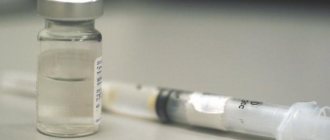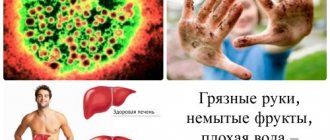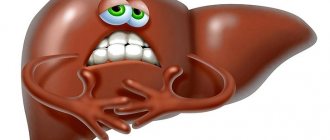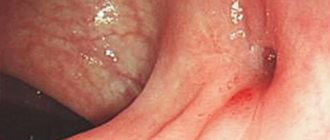Viral hepatitis B is an infectious liver disease caused by the virus of the same name (hepatitis B virus), characterized by severe inflammatory damage to the liver. The disease has various forms - from viral carriage to acute liver failure, liver cirrhosis and liver cancer. The disease is transmitted sexually and through contact with blood or other biological fluids (sperm, vaginal discharge, cervical discharge) of a patient or carrier of the hepatitis B virus.
Vaccine options
All modern vaccines for the prevention of viral hepatitis B are produced using genetic engineering technology.
A segment of the virus genome is introduced into the genetic material of baker's yeast, which is responsible for the production of the “Australian” (HBsAg) antigen. Vaccines consist of almost 90-95% antigen and only 5-10% of other components. The following vaccinations are used in Russia: “Vaccine against hepatitis B recombinant”, “Regevac V”, “Engerix V”, “Bubo-Kok”, “Bubo-M”, “Shanvak-V”, “Infanrix Hexa”, DPT-GEP B All of these vaccines are weakly reactogenic, interchangeable - that is, the course of vaccinations can be started with one vaccine and finished with another (although it is still preferable to vaccinate within the course with a vaccine from the same manufacturer). They are intended for vaccination of children and adults against hepatitis B.
The second, non-specific, but important component of vaccines is aluminum hydroxide. This substance is a so-called depositing agent in vaccinations and is designed to enhance the immune response. Its purpose is aimed not only at strengthening the immune response, but also at the dosed release of antigen from the site of hepatitis B vaccination. The need for it is dictated by the fact that, as a rule, vaccines based on only one antigen are weakly immunogenic, and in order to achieve the required levels of formed antibodies require either the introduction of more antigen or an increased response to it.
Publications on the topic
Vitamin C. How to understand it?
Prozorovsky Valentin
Vitamin C and its effect on the human body. How to take ascorbic acid. Is ascorbic acid always safe?
Vitamins: to drink or not to drink?
Volgin Alex
We learned that vitamins are vitally important back in school. Their absence in food causes vitamin deficiencies - a rather serious pathology with clear characteristic manifestations.
And your baby will be strong!
Mashusha-shusha
Everyone knows the recipes for health. But does everyone use them?
How to boost immunity in children and adults: a recipe for good immunity
Zhukov Nikita
Strengthening the immune system - without gauze bandages and hand sanitizer
Principles and purposes of vaccination
About 780,000 people die every year from the consequences of hepatitis B. Vaccination is not only the main and important means of preventing viral hepatitis. It may also protect against primary liver cancer. The basis for preventing hepatitis B is the vaccine against this disease. WHO recommends that all infants should receive hepatitis B vaccination as soon as possible after birth, preferably within 24 hours. The dose given at birth should be followed by two or three subsequent doses to complete the vaccination series. In most cases, one of the following two options is considered optimal:
- a three-dose hepatitis B vaccination regimen, in which the first dose (of monovalent vaccine) is given at birth, and the second and third doses (of monovalent or combination vaccine) are given at the same time as the first and third doses of DPT vaccine;
- A four-dose regimen in which the first dose of monovalent vaccine given at birth is followed by 3 doses of monovalent or combination vaccine, usually given along with other vaccines as part of routine childhood immunization, is indicated for children born to mothers infected or with hepatitis B.
After a full series of vaccinations, more than 95% of infants, children of other age groups and young adults develop protective antibody levels. Protection lasts for at least 20 years and possibly a lifetime. All previously unvaccinated children and adolescents under 18 years of age should receive the vaccine if they live in countries with low or moderate endemicity. By the end of 2013, hepatitis B vaccine for infants had been introduced nationally in 183 countries. Global coverage of three doses of hepatitis B vaccine is estimated at 81%, and for Western Pacific countries it reaches 92%.
Indications for hepatitis vaccination in adults
Immunity against hepatitis does not last forever, so the prophylactic drug should be reintroduced periodically. In order not to miss the moment when specific immune protection begins to decline, it is enough to periodically donate blood from a vein to determine the concentration of the surface antigen HBsAg.
As soon as anti-HBs volumes fall below 10 mIU/ml, revaccination can be done. Vaccination is especially important for citizens who are at risk for hepatitis infection. These include:
- Citizens who abuse alcohol.
- Injection drug addicts, homosexuals.
- Persons who are promiscuous and neglect contraceptives.
- Patients with chronic liver diseases.
- Those who are undergoing abdominal or invasive surgery, organ or tissue transplantation, or blood transfusion.
- Donors who donate their blood or its components.
- Patients undergoing hemodialysis.
- Relatives or colleagues of the patient or carrier who are forced to contact him.
- Workers in medical institutions, especially those who come into contact with the blood of patients.
- Medical students.
- Employees of general education and preschool institutions.
- Specialists servicing water supply systems and sewage drains.
- Pupils and staff of boarding schools, orphanages, boarders of homes for the disabled, nursing homes.
- Vacationers, military personnel, travelers, correspondents departing for countries with an increased risk of infection.
- Citizens living in regions with high incidence rates.
- Persons who have had contact with infected material when the likelihood of infection is too high.
It is important to remember that proper vaccination protects the body from dangerous complications of viral hepatitis B: carcinoma, liver failure, cirrhosis.
Vaccine effectiveness
The vaccine is highly safe and effective. More than one billion doses of hepatitis B vaccine have been administered worldwide since 1982. In many countries where typically 8% to 15% of children had chronic hepatitis B virus infection, vaccination has helped reduce rates of chronic infection among immunized children to less than 1% .
After a course of immunization, sufficient immunity is developed in 90% of vaccinated people. Vaccinations can reduce the incidence of hepatitis by 30 times and prevent at least 85-90% of deaths due to this disease. In addition, the risk of getting sick in those born to mothers who are carriers of the infection is reduced by 20 times.
Many researchers call the hepatitis B vaccine the “first cancer vaccine” because it prevents the development of HBV infection, which ultimately leads to hepatocellular carcinoma.
Execution Process
Hepatitis vaccination can be done in private or public clinics. To find out about the schedule and location, you need to contact the medical institution at your place of residence.
If a person lives in a place where there is high infection, then he undergoes testing in advance. Specialists must detect the presence of antibodies to the virus in the blood. If the analysis shows that antibodies are present, then the vaccine is not given. This means that the person has previously had this disease.
The injection is given intramuscularly in the shoulder, buttock or the very top of the thigh. Doctors do not recommend administering the vaccine subcutaneously, because efficiency decreases. The body does not respond, the immune system does not increase. This method is used only in cases where the patient has poor blood clotting.
Preparation
There is a certain preparatory procedure:
- Before getting vaccinated, you need to visit a doctor who will give permission for it.
- If a person is prone to allergic reactions, then be sure to visit an allergist.
- A day before vaccination, you need to cleanse your intestines. To do this, you can use laxatives or an enema.
- Be sure to dress appropriately for the weather so as not to overheat or overcool your body.
- A couple of hours before the procedure, avoid eating any food. The stomach should be empty.
Vaccination scheme
Before starting the procedure, the doctor examines the patient. It is mandatory to measure temperature and blood pressure. If everything is fine with the patient, then the specialist proceeds to perform the vaccination.
Post-vaccination reactions
Modern vaccinations against hepatitis B are characterized by an extremely high degree of purification, up to 95% of their volume is represented by antigen. In addition, vaccinations consist of only one antigen, the content of which is measured in micrograms. Both of these factors determine that in practice these vaccines are among the safest, “mildest”, and easily tolerated.
The most typical post-vaccination reactions to hepatitis B vaccines are local reactions (ie, those occurring at the injection site). Their frequency is fairly standard for all available vaccines - up to 10% (maximum) of vaccinated people report symptoms such as redness, slight thickening, and discomfort during active movements. The prevalence of local reactions is explained by the action of aluminum hydroxide, a substance that is specifically designed to enhance the inflammatory reaction at the site of drug administration so that as many immunocompetent cells as possible come into contact with the injected antigen.
Much less frequently, with a frequency of about 1% (maximum - 5%), the so-called so-called general reactions, i.e. affecting the body as a whole - a slight increase in body temperature, mild malaise, etc. All of the above reactions are normal (expected), appear within 1-2 days from the moment of vaccination and disappear without treatment within 1-2 days.
Reviews
Semyon Petrovich, 58 years old : My grandson is sick with hepatitis B, and since we live together, I went to the clinic to get the vaccine. But the doctor said that I was not entitled to a free vaccine due to my age and that I had to pay for it.
Intoxic is an anthelmintic that safely removes parasites from the body. Intoxic is better than antibiotics because: 1. It kills parasites in a short time and gently removes them from the body. 2. Does not cause side effects, restores organs and reliably protects the body. 3. Has a number of medical recommendations as a safe remedy. 4. Has a completely natural composition.
Deciding that I had been deceived, when I returned home I prescribed the hepatitis B vaccination for adults and was convinced that the doctor was right. By law, free vaccinations are provided up to 55 years of age. There I studied patient reviews and chose Combiotech. There were no side effects after the injection.
Sonya, 33 years old : Before leaving for Africa, where she was going to her sister’s wedding, she needed a vaccination against hepatitis B. She immediately agreed to the Regevak vaccine, recommended by the doctor. Everything went perfectly. The only side effect is drowsiness. But the next morning there was no trace left of her.
Victor, 21 years old : After the first vaccination, Euvax began to choke, developed a sharp headache and a fever. It’s good that the clinic is close to home and they immediately gave me some kind of injection. For the next time, I was prescribed the Combiotech vaccine. After the injection, I didn’t leave the hospital for about an hour – I was afraid. This time everything went fine.
Contraindications
The only specific and absolute contraindication for vaccines against the hepatitis B virus is an allergy to products containing baker's yeast. Temporary contraindications: severe reaction (temperature above 40oC, swelling, hyperemia > 8 cm in diameter at the injection site) or complication (exacerbation of chronic diseases) to the previous administration of the drug. Routine vaccination is postponed until the end of acute manifestations of the disease or exacerbation of chronic diseases. For mild ARIs, acute intestinal and other diseases, vaccinations can be carried out after the temperature has normalized.
Hepatitis C: features
The disease is most easily acquired hematogenously, that is, the virus enters the bloodstream. Several decades ago, it was through blood transfusions from a carrier donor that most people became ill. A dangerous factor contributing to the spread of the disease is the increase in the number of drug addicts, insufficient disinfection of equipment in nail salons, tattoo and piercing salons, etc. In rare cases, the virus can be transmitted through sexual contact or during childbirth.
Symptoms appear even a year after the virus enters the blood. The acute period lasts two to three weeks, after which in eighty percent the disease passes into the chronic stage. Characteristic symptoms are joint pain, general weakness, fatigue and indigestion. Since the symptoms are not specific (without jaundice of the skin and fever), the disease is mostly diagnosed by chance. If the disease is not cured, it threatens to provoke cirrhosis of the liver, and can also become a trigger for the occurrence of malignant neoplasms in liver cells. As a rule, it is at the moment of irreversible changes that characteristic signs of liver damage to hepatitis appear. Since diagnosing the disease is quite difficult, and the level of spread of the disease is high, the only correct and effective solution to reduce the incidence will be a vaccine against hepatitis C.
Routes of administration
The drug should be administered exclusively intramuscularly. When administered subcutaneously, the effectiveness of vaccines is noticeably reduced, and a compaction forms at the injection site.
Such vaccines are considered ineffective in many countries and are canceled after some time with another injection. This approach is due to the fact that when administered intramuscularly, the entire vaccine penetrates the bloodstream, providing an immune response of the required intensity.
For newborns and young children, the vaccine is usually administered in the thigh area.
For older patients, injections are given in the forearm. It’s just that on the hips and shoulders the muscle structures are very well developed, close to the skin layer, and have no fat layer.
You cannot inject into the gluteal region, since the fat layers are well developed and drive the muscles deep into the pelvic tissues, from where it is much more difficult to get them. And when injected into the gluteal mouse, there is a high probability of damaging nerve or vascular tissue.
Price
For children and adults up to 55 years of age, Russian clinics provide free immunization against hepatitis B. It is carried out at the clinic at the place of registration. You can get vaccinated for a fee in a private clinic or specialized center.
In general, a medical consultation and a course of injections will cost about 1000-3000 rubles. You can purchase the vaccine yourself at the pharmacy, bring it to a medical facility, and only pay for the intramuscular injection. In pharmacies, one vaccine can cost about 250±100 rubles.












